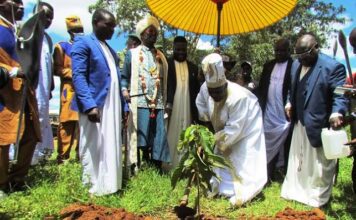Community members in Urshalima and Filiya, located in Gombe State’s Shongom Local Government Area, have taken a proactive step to combat climate change by launching tree-planting campaigns.
Grace Garba, a 14-year-old student who participated in the initiative, shared her personal story of how a windstorm left her family homeless, highlighting the importance of tree planting in mitigating the effects of climate change.
She praised her community for coming together to address this critical issue, emphasizing the valuable lesson she learned from her experience.
“Before, I didn’t know the importance of planting trees in my neighbourhood but now I do. I know that trees help to prevent windstorms from causing havoc and I remember how our roof was blown away and there were no windbreakers. It happened in 2021. The weather just changed and we were in one of the rooms. We had to move. I wept that day,” Garba narrated.
The young climate change advocate said she hopes to ensure that those who degrade the environment are punished.
“I wish to become a lawyer to ensure that those who fell trees indiscriminately are punished. I hope to better advocate the importance of planting trees. I’m happy that my community has taken up the challenge towards securing property and lives.”
Nikano Edward, Chairman of the Urshalima Water, Sanitation and Hygiene Committee, outlined a 10-year plan to transform the community into a lush, tree-filled area, emphasizing the benefits of planting economic trees that will provide long-term financial benefits alongside environmental advantages.
He stated, “In five to ten years if you come back to this community, you will find economic trees. There will be continuous tree planting. We have prepared the seed beds and there will be continuous tree planting.”
Edward noted that the community, which relies heavily on agriculture, has been severely impacted by the effects of climate change over the years, highlighting the need for sustainable measures like tree planting to mitigate these effects and ensure a resilient future.
“Rainfall can’t t be predicted accurately again and when it rains, it floods our farmlands. We deliberately chose to involve the young ones for sustainability,” he noted.
Gurbor Madaki, the Communications and Mobilisation Officer for the Rural Water Supply and Sanitation Agency, pledged to support the community’s initiatives by providing access to clean water through the construction of boreholes, complementing their tree-planting efforts and enhancing overall community development.
She stated, “RUWASA is in support of their contribution. We have also been awarded the contract to provide water here for watering the plants. We want to encourage the residents because it’s impressive to see their effort in fighting to ensure environmental restoration.”
Bala Adams, a Waste Consultant with the United Nations Children’s Fund, praised the Urshalima Community’s tree-planting initiative as a laudable follow-up to their earlier decision to end open defecation, which had contributed to various environmental problems, and acknowledged their commitment to addressing these issues and creating a more sustainable environment.
He stated, “The community has claimed Open Defecation Free status, meaning that there is no single faeces in the community. They now have toilets in their homes.
“We awoke the community’s consciousness to climate change issues and we have lost a lot of trees in this community. The community decided to embark on tree planting, after deliberating with RUWASA, LGA.”
Adams explained that, to support the community’s waste management efforts, they were trained on converting waste into organic fertilizer for the trees, promoting a circular economy and sustainable practices that benefit the environment and the community’s tree-planting initiatives.
“Every waste from their household is a potential manure for growing every kind of crop. So they agreed to establish this orchard. UNICEF provided the technical requirements on how to manage waste to produce organic manure,” he mentioned.
